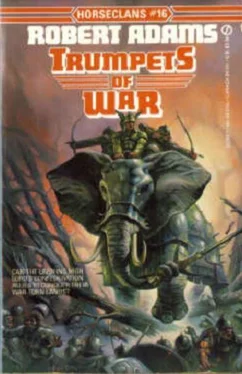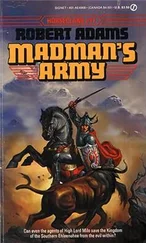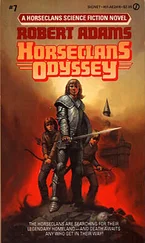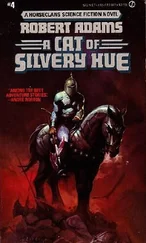“It was a very good, a very fitting suggestion, Portos. My wits must be slowing with age or I’d’ve thought of itmyself .”
Turning to the lieutenant, he said, “Help the thoheeks-designate up, drape him in his cloak again, and escort him back to his tent. There help him to dress and to arm, then bring him back here. Oh, and fetch back a brace of his guards to be his arming-men for the fight, for I doubt if any gentleman in this pavilion would care for that ‘honor.’ You might bring him back mounted, for we’ll all have to ride out to the site of the fight.”
When they had gone, Grahvos seated himself again and called for ewers of wine to refill the goblets and mugs. After they all were again brimming and the servants padded out, he asked, “Lord Klaios, what is the story on this parricide business? That’s a weighty charge, as I’m certain you are aware. A claimant to a title or to lands must swear powerful oaths that he never has done such, save accidentally, in the heat of a large battle, and Hahkmukos so swore before the assembled Council. If he perjured himself, then we must know.”
Thekomees set aside his goblet and shrugged. “No one ever proved it, my lord, Hahkmukos was never declared outlaw, you understand, but the late thoheeks did make it clear to him that he would assuredly be made to suffer for it if ever he returned to this duchy while still he was lord here.
“When she who had been Hahkmukos’ mother died, his sire remarried; of course, this was while Hahkmukos was away being given a gentleman’s education at his sire’s expense. When he returned, his sire put him to work in his shop. Then, of a day, his new young wife apprehended her stepson in the act of forcibly abusing one of his little half brothers in the way of his kind, whereupon Hahkmukos clubbed herdown, all but slew her on the spot.
“Her screams brought her husband and a brace of his customers from the shop into the living quarters, and after the raging young man had been subdued and the wife revived, and her story and that of the child had been heard and witnessed, the sire became enraged and made a sincere effort to kill or at least do serious damage to his eldest son, but his customers—both of them old friends of the sire—restrained him from doing more than beating the miscreant within an inch of his life.
“In the wake of it all, Hahkmukos left the home and shop and he repaired to and lived for a while in the most disreputable section of Ahndropolis. A few months later, of a night, someone burglarized the shop, entered the home behind it, and slew the man, his wife and all of his children by her.
“Naturally, in the wake of all that had happened before, Hahkmukos was immediately under suspicion, but the thoheeks’ investigators were unable to place him anywhere near that section of the city at the date and time of the murders and robbery. Nonetheless, lest certain folk be tempted to do him to death on strong suspicion, the thoheeks saw to it that Hahkmukos left the duchy for good and all. And no one here had seen him again until hecame riding into Ahndropolis to gloat that he now was confirmed as our thoheeks and was looking forward to settling a number of old scores within his duchy.”
“Get out of here, you little shoat!” Hahkmukos snarled at the young slave boy still squatting in the corner of the tent. Having suffered his master’s anger before, the child bundled his garment under a skinny arm and ran out into the drizzly cold.
“Will you grant me privacy to use the pot, Lieutenant?” asked the thoheeks-designate.
But upon the officer’s departure, it was not the brass chamberpot that Hahkmukos sought; rather did he depress what looked like just another stud set in the lower corner of a traveling chest. Out of the secret drawer that then silently opened, he took a leathern belt, the pockets of which bulged with weighty contents. When he had buckled the belt around his waist, he quickly covered it with a shirt of soft cotton, then a longer one of silk, which he stuffed into silk drawers.
Seating himself on the side of the sleeping couch, he pulled off the ankle boots, swathed his feet in two thicknesses of cotton cloth, then wrapped his lower legs in similar cloth, cross-gartering them before pulling on padded trousers that tied in place a few inches below each knee.
When the lieutenant reentered the tent, Hahkmukos had stamped into a pair of jackboots and was buckling the sides of a padded arming shirt. The officer helped finish the buckling, then his nimble fingers did up the leathern points that held on the sleeves of the garment. That done, the armor chests were opened and, one sitting, the other squatting, Hahkmukos and the officer inserted the steel splints into the sheaths let in the legs of the boots for the purpose, buckled on spurs, then knee-cops and plate cuishes above them.
The lieutenant grunted approval upon seeing the hauberk. Though decorated to the point of gaudiness, it was good, thick, first-quality, all-riveted rings that went to make it up, triple mail, split at front and back for riding, as well as on either side for ease of movement afoot, and with sleeves that descended to a bit below the elbow.
When Hahkmukos had wriggled into the mail shirt, he donned a padded coif—cotton inside, thick, sturdy silk outside—and the officer lifted out of its fitted place in the chest the backplate, whistling softly through his teeth as he recognized the rare quality of it. While he held the plate in place, the thoheeks-designate did up the straps and buckles crisscrossing shoulders and chest, then he held the breastplate secure while the officer matched the halves of the hinges and inserted the hingepins on the one side, then snapped closed the catches on the other.
Elbow-cops were buckled below brassarts which themselves were overlapped by spauldrons of steel scales riveted to thick leather. When he had cinched the waist with a studded swordbelt, the officer fitted the cased sword and a broad-bladed battle-dirk to it, then handed Hahkmukos his armored gauntlets and the battle-helm—a fine, Pitzburk-made helm, with hinged visor and gorget and feeling to be of a weight of eight or nine pounds.
But when he inquired, Hahkmukos told him, “I don’t have a shield with me. I’ll have to take one from one of my guards. Where are the two you brought to be my arming-men?”
The lieutenant made a wry face. “Lord, the camp of your guards is deserted. The picket lines are empty, and have been stripped of anything usable or small and valuable. Your servants say that the guards hurriedly packed and rode off with their pack train at a hard gallop while we were at the headquarters pavilion. However, your own horses are left, and the servants should have two of them outside the tent by now. I’m certain we can get a shield from one of my men.”
Outside the tent, two saddled horses had been tied, but not one servant or slave was within sight. “Lieutenant, it’s been some time since I tried to mount while wearing armor and weapons. Give me a leg up,” said Hahkmukos blandly.
The young officer shrugged and obliged him. But no sooner was the thoheeks-designate firmly in the saddle than he smashed his muddy bootsole full into the officer’s face, grabbed the reins of the second horse and spurred his own into a fast canter out of the camp, not galloping solely because he did not wish to attract undue attention.
“The fools,” he thought, “I saw right through them from the very start. No, they had no plans on my life, that mewling old bastard of a Grahvos swore. No, they didn’t, not that pack from Mehseepolis, no, they just meant to rob me and humiliate me, then to let that damned usurper of a Klaios cut me down. They must have known that I’m not a fighter, that my armor and weapons were bought only for appearance and because in the grades of Pitzburk I bought, they are damned good investments, just as these blooded horses are.”
Читать дальше












